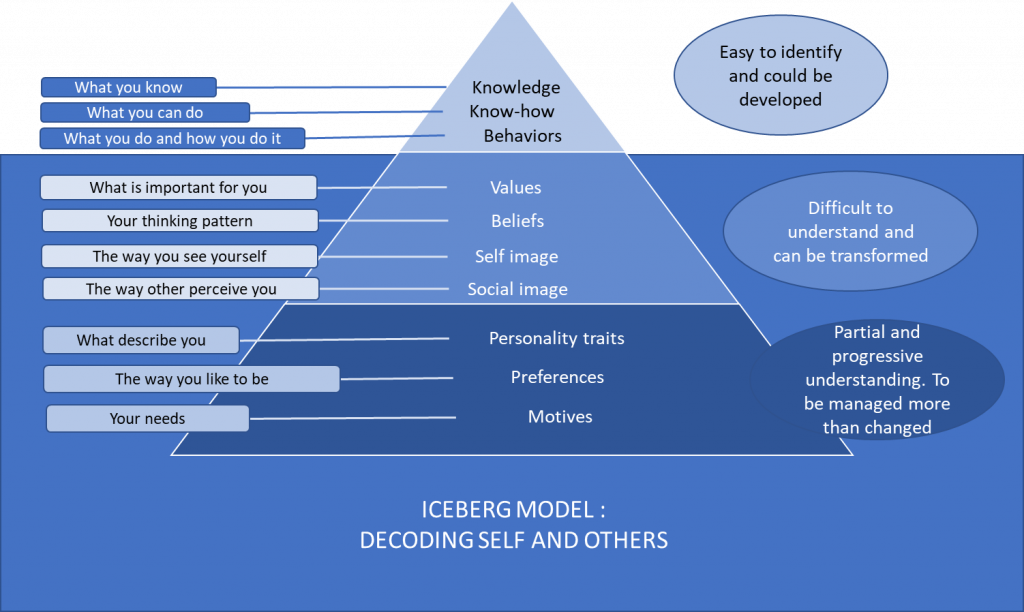The best way to be self aware is to look for understanding others. André Gide
Decoding, a key of success for leader
A leader, especially during an onboarding period, must exercise great vigilance regarding what he sees, hears, feels. To decode your environment, one of the major challenges is to understand the people who are at the heart of your working context. The question therefore arises: how to have better self knowledge and understand others? Sufficiently, completely and profoundly in order to be able to interact positively with them?
The market offers many assessment tools or psychometric tests for self discovery and to better understand others. Faced with the profusion of tests, it is easy to get lost, especially since many tools seek to aggregate several concepts (personality traits, values, motivation, preferences, etc.) without always trying to link these concepts together.
This is why, in this article, I propose to share with you a model that I have developed from different concepts I have used during more than 25 years of experience in supporting leaders in their professional challenges. Regularly over this period, I have been supporting leaders who were poorly equipped when it comes to decoding others and interacting adequately with them. Surprisingly, many of these leaders are experienced and trained. They have often worked hard on themselves to become better leaders and, for most of them, have undergone training to develop their skills as visionaries, strategists and communicators. Despite this, I often have to work with them on the management of their “stakeholders”, and, regularly, they demonstrate or express difficulty in describing their interlocutors beyond a few obvious facts. Consequently, finding words to describe their stakeholders, their motivations, their personality, their values or their preferences always proved to be a delicate and difficult exercise.
Helpless leaders facing decoding exercise
This made me wonder why competent and experienced leaders had such a hard time doing this decoding exercise?
Although the answer is significantly different for each leader, it seems to me that some common reasons exist:
- Most leadership development training places great emphasis on self-knowledge, but little on decoding others. This decoding is often perceived as an extension of self-knowledge, a prerequisite to better understand others (cf. Goleman conceptual framework). If you focus too much attention on yourself, you run the risk of forgetting others or at least not paying them the attention they require.
- The personal development and leadership development market is obese and chaotic. Obese, because there are too many tools, methods, concepts or pseudo-concepts that offer self discovery, better self-management and sometimes to help you better interact with others. Chaotic, because each tool or method is based on its own conceptual model and its own definitions of identical or similar words and themes. The result is confusion for those who want to rely on a clear, stable and holistic conceptual framework.
- Faced with this lack of a common theoretical foundation, each leader can make their mark through the training they have followed and the concepts they have encountered. Each one builds their own body of knowledge from heterogeneous information that is sometimes incompatible or superimposable. Thus, they may lack method in their decoding and will often act intuitively with, in the background, the set of experiences that marked them during their career to date.
A tool to develop increase self awareness and decoding others
In light of these findings, I have created a model based on different concepts developed by recognized authors. It seeks to offer a coherent aggregation of theoretical approaches and frameworks conceived independently (the preferences of Myers Briggs, the motivations of McClelland, the personality traits of Goldberg, 1981,…).
In my coaching practice, I mainly use this model with my coachees as a decoding tool: self-decoding first, but above all decoding of others. By decoding, I mean a voluntary and conscious process which makes it possible to analyze, interpret and deconstruct the object of the study (self or others).
This decoding principle is based on 5 postulates:
1st postulate: good self-knowledge (self decoding) facilitates the understanding of others (decoding others).
2nd postulate: self-decoding and decoding others have their own objectives, but have a common purpose: to better interact with our environment.
3rd postulate: self-decoding and decoding others must be the subject of two distinct approaches, but they can rely on common decoding tools.
4th postulate: decoding others requires looking up and forgetting yourself. In this sense, a good self-knowledge makes it easier to do his épochè.
5th postulate: decoding others requires two distinct steps. These steps require opposite cognitive processes:
- 1st step: suspend judgment to observe and focus on what the other tells with their gestures, verbal and body language, attitudes and story.
- 2nd step: Analyze, classify and interpret to understand the meaning of the information collected.
While this model does not pretend to be the key to opening Pandora’s box, we can bet that it will help leaders find the right levers for their personal development and keys supporting them to interact positively with their environment.

Des pistes de réflexion pour réussir sa prochaine prise de fonction
In a future article, we will come back to this model to give you hints on how to use it for your own development or to help the people you support.
We will specifically focus on the following themes:
- How to analyze and decode these different levels of human personality?
- Which examples can we give to illustrate the iceberg model?
- How can a leader use the iceberg model to develop his leadership?
Who knows your needs better than you? Self awareness is the first aid … La Fontaine

